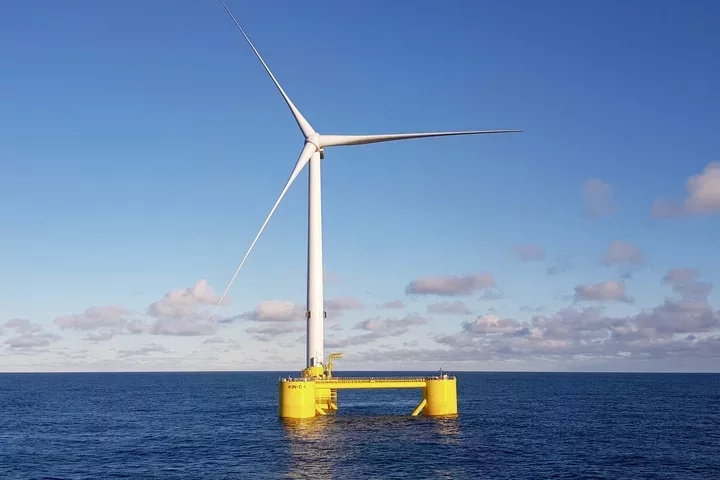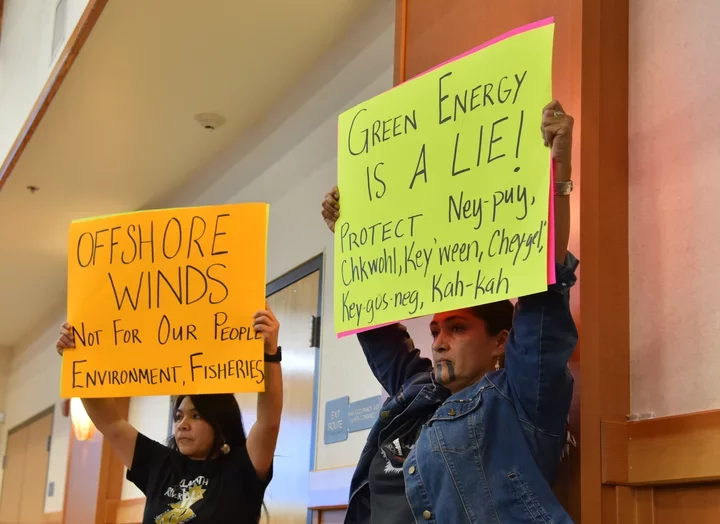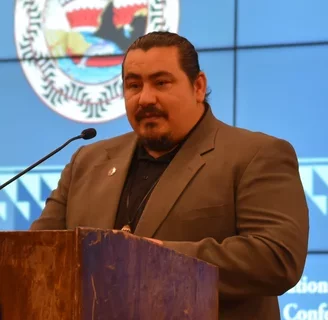File photo via Principle Power.
###
Several North Coast tribes have announced their official opposition to the floating offshore wind project slated for the North Coast, citing “grave concerns” about potential risks to marine ecosystems and the sustainability of industrial-scale renewable energy projects.
But does that mean that tribes are walking away from negotiations? And what impact does tribal opposition have on the future of offshore wind?
“This Was Not an Easy Decision”
The National Congress of American Indians (NCAI), the largest national organization of American Indian and Alaskan Native tribal governments, last month passed a resolution urging the Biden Administration to “halt all scoping and permitting for offshore wind projects until completion of a comprehensive and transparent procedure adequately protecting tribal environmental and sovereign interests is developed and implemented.”
This statement was quickly echoed by the Yurok Tribe, the Bear River Band of the Rohnerville Rancheria and the Tolowa Dee-ni’ Nation, whose tribal councils voted to formally oppose offshore wind development on the North Coast. The Cher-Ae Heights Indian Community of the Trinidad Rancheria Tribal Council approved a similar resolution just a few days ago.
The Resighini Tribe of Yurok People has also expressed concern about potential “cultural and environmental impacts” associated with the proposed project but has not taken an official position as of yet. “The current leases are within the Tribe’s unceded, ancestral waters and the Tribe prioritizes Tribal stewardship and marine protection,” according to a statement shared by the Tribe.
[UPDATE: Shortly after publication, the Outpost received an email from the Resighini Tribe of Yurok People announcing the Tribal Council’s recent decision to formally oppose offshore wind development “until those serious concerns can be addressed.”]
If the project is approved in the years to come, the Humboldt Wind Energy Area (WEA), located approximately 20 miles west of Eureka, could host hundreds of floating wind turbines across 200 square miles of deep ocean waters.
U.S. Secretary of the Interior Deb Haaland and Congressman Jared Huffman are visiting Humboldt County this week to meet with local tribes and hear their concerns, according to a recent report from the North Coast Journal.
“I’m very concerned about this issue, and I need to visit with the tribes and hear a little more about their position and its implications,” Huffman told the Outpost in a recent phone interview. “I don’t think anyone wants to see offshore wind or any other project run roughshod over tribal interest – that is the last thing I would support. I have been very supportive of this project because I believe it can be done in a way that’s quite positive for the entire community, including the tribes.”
Asked whether tribal opposition to offshore wind development could halt the proposed project, Huffman said, “I don’t know if it would stop it, but it certainly complicates the tribal consultation process and other aspects moving forward.”
“I really want to hear them out, and I want to see how I can lean in to make sure that the federal government, the wind developers and everyone else does a better job in their tribal consultations,” Huffman continued. “I’d like to find out what the tribes might be able to get out of these projects. … There are some community and tribal benefits on the front end through the auction proceeds, but longer term – in terms of royalties – there are not. We need to fix that for the long haul so that communities and tribes have an incentive to partner in these offshore wind projects.”
Activists protest at the Tribal Offshore Wind Summit. Melissa Star Myers (right) holds a sign that says, “Green Energy is a lie! Protect [the salmon, the seaweed, the sturgeon, the seagulls].” Photo: Isabella Vanderheiden.
The Yurok Tribe held a two-day offshore wind summit in Eureka earlier this year to discuss all aspects of the proposed development and the importance of including indigenous communities throughout the planning process. Representatives from the Bureau of Ocean Energy Management (BOEM), U.S. Department of Energy, Vineyard Offshore and Canopy Offshore Wind were in attendance, along with several tribal leaders from the East Coast who described their experiences in working with regulatory agencies and developers on an offshore wind project located off the coast of mainland Massachusettes.
Yurok Vice Chairman Frankie Myers said the “powerful testimony” shared by members of the Mashantucket Western Pequot Tribe, the Wampanoag Tribe of Gay Head (Aquinnah) and the Mashpee Wampanoag Tribe influenced the Yurok Tribe’s decision to oppose offshore wind.
“This was not an easy decision for the Tribe,” Myers told the Outpost in a recent phone interview. “We have tried to be open and neutral about our position for offshore wind because we as a collective community don’t have a really clear picture of what it’s going to look like, but we have a responsibility to our membership. … I think our decision ultimately came down to just not having enough information.”
Myers acknowledged the importance of moving away from fossil fuels to address growing concerns surrounding climate change but said the North Coast does not need another extractive industry.
“Sometimes I feel like I’m taking crazy pills. Like, how many times do we have to have this conversation … and expect that we’re going to have a different outcome?” Myers asked. “We know climate change is having an impact right now and we know it’s going to get worse. … We may be able to move away from burning fossil fuels but if the industrialized offshore development ends up destroying our ocean ecosystem, then where do we sit? We don’t know 100 percent that that’s going to happen, but … we know for certain that there will be impacts. We can’t destroy our world to protect our world.”
That being said, Myers emphasized that tribal leaders “aren’t gonna go bury our heads in the sand” and will continue to participate in future discussions with regulators and developers.
“This isn’t a victory for us,” he added. “I think our members were happy that we took a stance in opposition, but no one thinks that stopping offshore wind is a victory. We know we have to do something, that we have to find an alternative energy source that allows us to move away from fossil fuels because of the impacts that we’re seeing within our communities.”
Regulators Call for “Meaningful Dialogue”
Reached for additional comment on the matter, BOEM spokesperson John Romero offered assurance that the federal government has “taken coordinated actions to incorporate indigenous knowledge and tribal input into [its] decision-making process.”
“BOEM is committed to upholding our tribal trust responsibilities and fostering working relationships based on trust and meaningful consultation and we are always working to improve the consultation process to engage Tribes in a respectful way,” Romero wrote in an emailed response to our inquiry. “We are interested in discussing how Tribes envision improvements to the process.”
The offshore wind leases auctioned off in December 2022 include several conditions and stipulations requiring developers to make communications plans with tribal nations. The lease agreement also includes a five percent credit for developers who committed to Community Benefits Agreements (CBAs) with tribes, communities and stakeholder groups “whose use of the lease areas or use of the resources harvested from the lease areas is expected to be impacted by offshore wind development.” The agreement includes a five percent general CBA as well.
Romero also pointed to several studies conducted through BOEM’s Environmental Studies Program, including tribal cultural landscape assessments and an Archaeological and Biological Assessment of Submerged Landforms off the Pacific Coast.
“It is important to BOEM that we consider any potential impacts to Tribes,” Romeo said. “We will continue to consult and engage with Tribes throughout the process and remain committed to exploring improvements to the process along the way.”
Similarly, the developers – Canopy Offshore Wind and Vineyard Offshore – underscored the importance of “meaningful” collaboration with tribal nations throughout the planning process.
“From the very beginning of our work in California, we recognized the importance of meaningful dialogue and building relationships with Tribal Nations, through engagement with Tribal Councils, leaders, and members,” according to a statement shared by Vineyard Offshore Spokesperson Andrew Doba. “We’re honored to have engaged in early conversations and look forward to continuing those discussions moving forward.”
Ciara Emery, Canopy Offshore Wind’s local government and stakeholder engagement manager, added that the company is “open to many forms of collaboration” with tribal nations, including partnerships. However, it is still very early in the development process, which is likely to extend over the next decade, she said.
“[W]e want to take the time to build these relationships,” Emery wrote in an emailed response to the Outpost. “The Canopy team has had dozens of meetings with tribal nations up and down the coast and is eager to continue listening and exploring ideas to foster mutually beneficial outcomes. … There is time to continue important conversations, respond to feedback and deepen collaboration.”
###
PREVIOUSLY:
- At a Two-Day Conference in Eureka This Week, North Coast Tribes Advocate for ‘Meaningful Engagement’ With Offshore Wind Developers, Federal Regulators
- Yurok Tribal Council Votes to Formally Oppose Floating Offshore Wind Energy Projects Along the North Coast
- Bear River Tribal Council Joins Yurok in Formally Opposing Offshore Wind Development Along the North Coast
- Trinidad Rancheria Becomes Latest Tribal Entitiy to Register Opposition to Offshore Wind



CLICK TO MANAGE